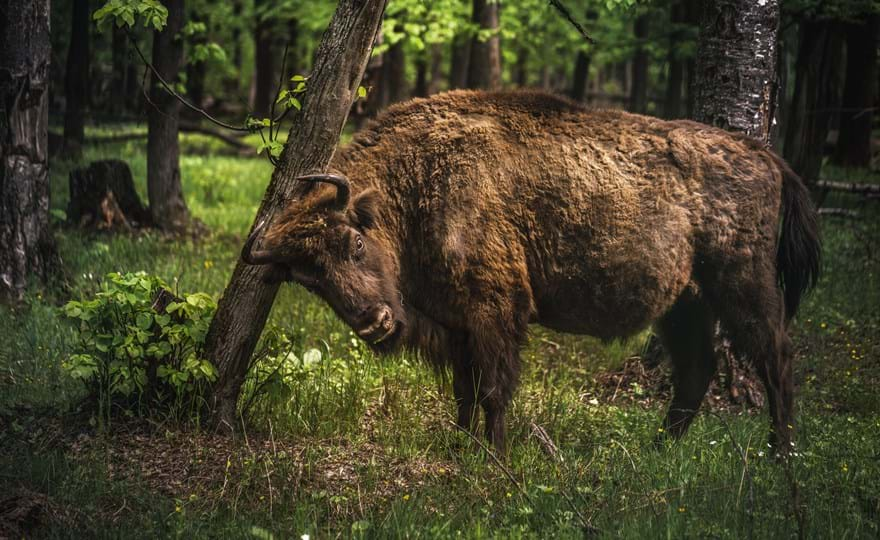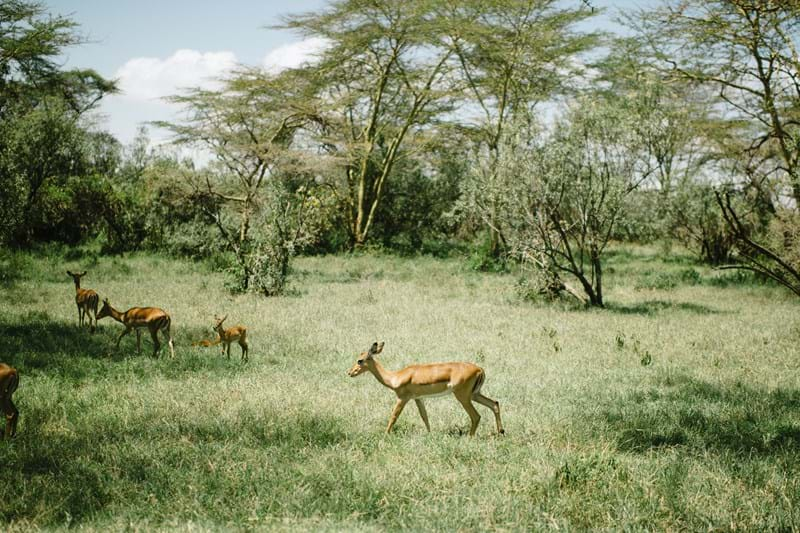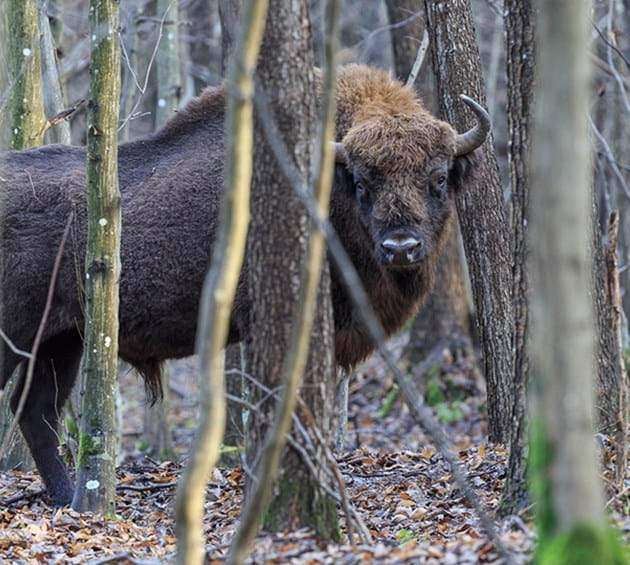ClientEarth Communications
20th July 2021


Read the story of how we stepped in to save Europe's oldest forest.
News that the Polish government wanted to increase logging in one of Europe’s last primeval forests shocked environmentalists throughout Europe. Polish people, for whom the forest holds great importance, were particularly worried about its future.
Bialowieza, a vast woodland across Poland and Belarus, is the only remaining primeval forest in the EU, and a UNESCO World Heritage Site. It’s home to some of Europe’s most fragile species and habitats, like the three-toed woodpecker and the European bison. For this reason, it’s protected by EU conservation law called the Habitats Directive, and is part of the Natura 2000 network.
Ministers used a bark beetle outbreak to justify the logging. However, most scientists, including those from Poland’s leading nature conservation institutes could find no scientific evidence to suggest that this would benefit the forest.
On the contrary, it was clear increased logging would disrupt this finely balanced ecosystem. Bark beetle outbreaks have been a natural part of the forest’s life cycle for thousands of years
We and others saw that that fighting bark beetles was nothing more than an excuse for the Polish government to increase the timber trade.
“The Minister’s decision to drastically increase logging in Bialowieza violates EU law”
- Marcin Stoczkiewicz, ClientEarth
It did not go unnoticed that the Polish environment minister was ignoring legislation designed to protect rare plants and animals. Resistance was swift. Many grassroots groups came together to raise awareness about the forest’s plight.
Within weeks more than 120,000 Poles petitioned the government to halt the logging. However, the authorities actively ignored the will of the people, and the felling ramped up.
Much more and Bialowieza could have been stripped of its world heritage status. UNESCO had delisted two sites in the past: the Arabian Oryx Sanctuary in Oman and the Dresden Elbe Valley in Germany both lost their status due to habitat destruction and increased human interference. Bialowieza was the only site in Poland with this prestigious world heritage accolade. Poland had a lot to lose.
However, despite huge protests in Poland, ministers turned a blind eye.
By the end of March 2016, the Polish Minister of Environment still had not rescinded his plan for a threefold increase in logging. As the forest was protected by EU habitats law, ClientEarth’s environmental lawyers found that this decision breached EU law. Further investigation found that the government had also failed to carry out a proper assessment of how their decision would impact the forest.
ClientEarth wrote to the Polish Minister of Environment, Jan Szyszko, to warn him of this. Marcin Stoczkiewicz, senior lawyer and Head of ClientEarth Central & Eastern Europe said: “The Minister’s decision to drastically increase logging in Białowieża violates EU law. Szyszko should reverse this decision before the logging starts and it is too late.”
Despite being told his decision was illegal, Szyszko did not listen. With the safety of the forest now under significant threat, further action needed to be taken. It was not possible to challenge the Minister’s decision under Polish law, so ClientEarth had to find another way.
On 19 April, ClientEarth along with several other Polish and international NGOs lodged a complaint to the European Commission, calling for an investigation into the illegal plan. ClientEarth lawyer and author of the complaint, Agata Szafraniuk, said: “We told the Minister his action was illegal, but he didn’t listen. A Commission complaint is our last resort. We urge the Minister to reconsider before this irreplaceable forest is lost forever.”
Within two days, the Commission announced it was “concerned” about the decision and had decided to contact the Polish authorities. Meanwhile, the logging had not gone unnoticed by UNESCO. By June, they had sent four advisers to investigate the situation on the ground.
We told the Minister his action was illegal, but he didn’t listen. A Commission complaint is our last resort. We urge the Minister to reconsider before this irreplaceable forest is lost forever.Agata Szafraniuk, ClientEarth

It became clear to the European Commission that something was amiss. On 16 June 2016, it started infringement proceedings against the Polish government, giving them one month to respond.
At the same time, both UNESCO and the European Parliament publicly condemned Szyszko’s decision.
One of our wildlife lawyers, Agata Szafraniuk, says : “Starting legal proceedings shows the Commission agrees the Polish government violated the law when it decided to increase logging in Bialowieza. This contradicts Polish government claims that the Commission supports felling.”
More bad news came in early 2017 when Szyszko told journalists he planned to intensify logging in the forest.
The European Commission decided to take the final step before litigation in the EU Court, giving Szyszko one month to reverse the decision.
Agata says: “This was the last and final warning for Poland’s Environment Minister Jan Szyszko. The Polish government was not only violating the law, it was attacking its own land and the people who want to protect it. If the case goes to the EU Court of Justice, it would be hugely embarrassing for the Polish government. There was also a high chance of being handed significant fines, with taxpayers footing the bill.”

In July 2017, the European Commission referred the complaint about ongoing illegal logging to the Court of Justice of the EU. The Court responded swiftly, issuing a ban on logging, saying all chainsaws and harvesters must be stopped immediately. In the history of the EU, emergency nature conservation measures like this have been used just three times before.
In parallel, UNESCO warned that if the situation didn’t improve, Bialowieza Forest could be added to the list of World Heritage Sites in Danger.
Minister Szyszko once again decided to ignore the interim measure. This unprecedented flouting of a direct order from the Court of Justice had never happened before. In response, the Commission submitted a formal request to the Court of Justice of the EU to impose financial penalties over the logging.

In November 2017, the Court of Justice announced it would impose fines of at least €100,000 a day if Poland’s Environment Minister kept ignoring the Court’s decisions. This formal warning set a new precedent – financial consequences had never before been applied at this stage of the procedure. ClientEarth’s Agata Szafraniuk and Katarzyna Kościesza visited the forest to see the logging first-hand.
Shortly afterward, a hearing took place at the Court of Justice of the EU to decide whether Polish environment minister Jan Szyszko broke the law when he allowed increased logging in Bialowieza.
Szafraniuk said: “We do not believe that the minister will risk the Polish budget and force us, all Poles, to pay 100,000 euros a day in fines for breaching the interim order to stop illegal logging, plus millions of euros for not complying with the final judgement.”
Sure enough, by the end of November 2017, the harvesters had withdrawn from the forest.
The ClientEarth team entered 2018 filled with hope that we would find a lasting solution to protect this precious forest. This sense of hope increased when, in early 2018, Jan Szyszko was dismissed from his post.
“The appointment of a new Minister of the Environment gave us great hope for a return to a situation in which the Ministry acts to protect, not destroy our natural heritage,” says Agata.
ClientEarth and six other ecological organisations later met with Henryk Kowalczyk, who replaced Jan Szyszko. The groups presented the case for proper and lawful protection of Bialowieza. The Minister said he would listen to environmental campaigners – but it remained to be seen how he would put his declarations into practice. One of our demands was to grant the entire Bialowieza Forest national park status. If granted, this primeval forest would be protected from excessive logging for good.
In April 2018, the EU’s top court ruled that increased logging in Bialowieza Forest violated EU law. The ruling came into force immediately, so the Polish Environment Minister had to quickly reverse the decisions that allowed logging. If he failed to do this, the government risked a minimum fine of €4.3 million and up to tens of millions of euros.
ClientEarth chief executive James Thornton said: “This is a huge victory for all defenders of Bialowieza Forest. Hundreds of people were heavily engaged in saving this unique, ancient woodland from unthinkable destruction.
“We warned that the increased logging would breach EU law even before the minister officially authorised it. From a legal perspective, the case has been as clear as day from the beginning – it was very obvious that the law was being broken.”
The judgment is final and the government cannot appeal it.
The first step was to reverse the decisions that allowed the logging to begin in the first place. In May 2018 the Polish Minister of Environment agreed to repeal one of the two illegal logging permits. However, this means that the government only half-complied with the order protecting the forest.
Almost three years on from the ruling and the Polish Government has still not repealed the second illegal logging permit.
In February 2021, the European Commission started proceedings against the Polish Government for this continued failure to protect Europe’s oldest forest. Their decision to take action shows that rulings by the EU’s top court cannot be ignored.